![]() — Home — Business News
— Home — Business News
Weekly Business News from Myanmar
-
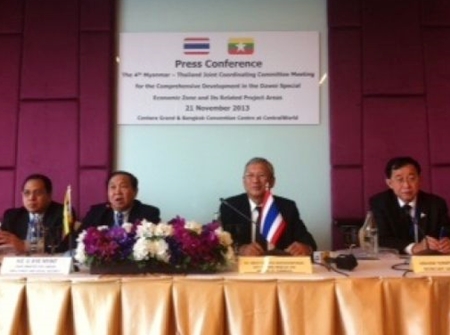
The eighth Joint Coordinating Committee on Dawei (JCC) has decided to seek parliamentary approval in order to ask Thailand for a soft loan to fund the two-lane project
The eighth Joint Coordinating Committee (JCC) meeting was held in Thailand on June 29-30 and has decided to seek parliamentary approval in order to ask Thailand for a soft loan to fund the two-lane project. If approved, a task force will be formed to assess and review the development and issues caused by Italian-Thai Development (ITD) over a period of three months. In addition, officials from the Japanese government will take part in future JCC meetings, said U Myint San, vice chair of Dawei Special Economic Zone’s management committee. Commerce minister U Than Myint and Arkhom termpittayapaisith, Thailand’s transport minister, are the co-chairmen of the JCC. It is the first time the JCC meets under the NLD-led government. -
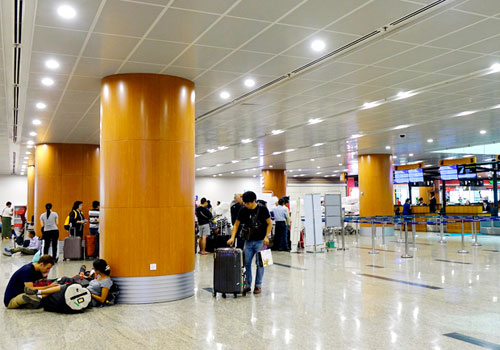
The final agreement for the construction of Hantharwady International Airport, located in the outskirts of Yangon, will be signed by Myanmar’s Department of Civil Aviation (DCA) in early 2018
Myanmar's Department of Civil Aviation (DCA) is set to sign the final agreement for the construction of Hantharwaddy International Airport in early 2018, the agency’s deputy director general told The Myanmar Times. The new airport, located on the outskirts of Yangon, would be able to handle more passengers and it will have modern facilities, according to DCA deputy secretary general U Ye Htut Aung. The Yangon International Airport’s optimal capacity is 2.7 million passengers but there were already three million passengers who entered used the airport in 2013, he added. The potential for the existing Yangon airport to expand is limited and it can no longer accommodate the increasing number of aircrafts. Hence, the government needs to construct a new airport to fulfil the demand. -

Grab and Wave Money signed an agreement to provide online payment for the taxi service in Yangon
Taxi service firm Grab and the e-payment platform Wave Money signed an agreement to provide online payment for the taxi service on June 29 in Yangon. Wave Money, the first licensed mobile-money service in the country, has detailed a plan to implement e-money accounts for Grab taxi drivers, moving the cash-based payment towards online transactions. “For Grab drivers, we will not collect charges for a Wave Money account. After adding money to that account, they can do many things such as transferring money, topping up mobile phone, paying their electricity bill etc,” said Brad Jones, CEO of Wave Money. Wave Money will provide Grab drivers an account and the drivers can deposit their money into those accounts. They can easily withdraw their daily income through 2,000 agents in Yangon. -
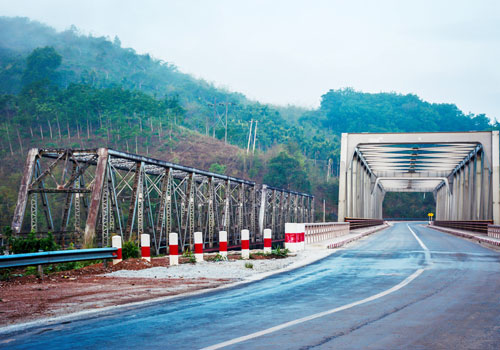
The drafting of the Master Plan for the Development of Tanitharyi Region will be led by the Japan International Cooperation Agency (JICA)
Japan International Cooperation Agency (JICA) will take the lead in the drafting of the master plan for Tanintharyi Region, according to a representative from JICA. The Myanmar government has asked the Japanese government for help in drawing up the Tanintharyi Region’s development master plan along with a comprehensive development plan for the Dawei special economic zone (SEZ) project. The request was made during official visits by Myanmar’s commerce minister and Tanintharyi Region’s chief minister in Japan and when State Counsellor Daw Aung San Suu Kyi held a meeting with Hiroto Izumi, special adviser to Japan’s Prime Minister Shinzo Abe, in August last year. -
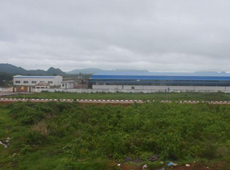
The investment proposals have been submitted by seven local and foreign companies for the Thaton Industrial Zone in northern Mon State (Ministry of Industry)
Seven local and for¬eign companies have submitted invest¬ment proposals for the Thaton Industrial Zone in northern Mon State, ac¬cording to the Ministry of Industry. The ministry said it is in the process of implement¬ing the proposals put for¬ward for the 678 acre site, which include medicine, soft-drink and garment manufacturing facilities. “We will also work to approve future proposals, together with those that have been submitted and those approved compa¬nies will be allowed to use existing industrial build¬ings in the zone should they want,” said an official from the state-owned No. 3 Heavy Industrial Enter¬prise (HIE-3) which has been tasked with imple¬menting the project under the ministry. -
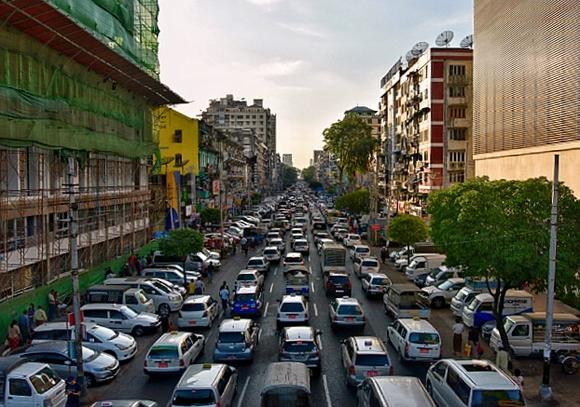
A general car importing policy will be issued to put an end to the current confusion in the industry (Commerce Minister U Than Myint)
The government will issue a general car importation policy within the year to put an end to the current confusion in the industry, Commerce Minister U Than Myint told The Myanmar Times. At present, there are several policies related to car importation. This has created confusion among the “legitimate vehicle importers” and the government will seek to clarify the policy, he said. In Yangon, for example, licenses for importing cars are still suspended. This suspension has lasted over a year. Yangon Chief Minister U Phyo Min Thein said that the government will move on to sort out the license issues after upgrading the Yangon Bus Service (YBS). The Yangon regional government has upgraded public buses under the new YBS. The YBS will be reaching its six-month marker in July but the Yangon chief minister is still unable to deliver a clear, defined policy concerning Yangon license permits needed for car importation. -
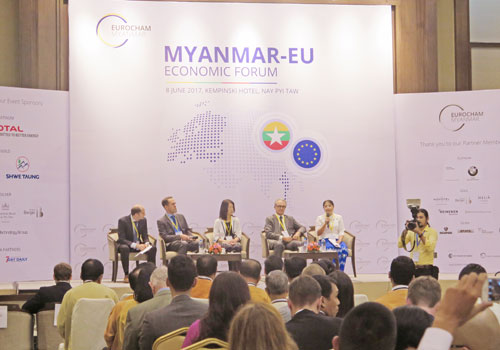
To ensure the country’s energy security, the government is currently streamlining its policy for the power sector: coal can be one of the options (Department of Electric Planning under the Ministry of Electricity and Energy)
The government is currently streamlining its policy for the power sector to ensure the country’s energy security and coal can be one of the options, according to Daw Mi Mi Khaing, director general of Department of Electric Power Planning under the Ministry of Electricity and Energy. Apart from energy security, the government is also taking into account the environmental and social impacts of energy projects as well as the pricing of power generation so the people and the industry can have affordable power, she said. The official added that the administration recognised coal-powered plants as one of the options to address the energy gap, but the population have to be consulted about whether coal should be used. “From the technical point of view, coal is one of the options for closing the power gap. -
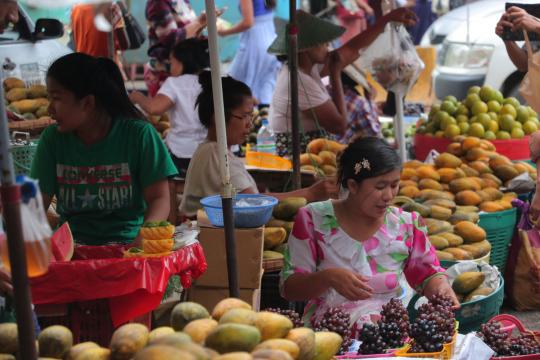
The Consumer Price Index (CPI) rose by 4% this year (Central Statistical Organization-CSO)
The Consumer Price Index (CPI) increased by 4 per cent this year, coming in at 132.4 per cent at the end of May, according to the Central Statistical Organisation (CSO). It stated that food and beverage was at 144.3 per cent while other goods were at 115.6 per cent. The report stated that Rakhine State, Kachin State and Tanintharyi Region showed the highest increase in CPI at nearly 10 per cent. The report said inflation was highest in Rakhine at 12.2 per cent, followed by Kachin with 8.9 per cent and Shan with 8.1 per cent. -
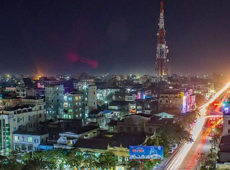
Mandalay’s total investments hit US$ 5.5 billion since data collection began up until April this year (Directorate of Investment and Company Administration – DICA)
Mandalay has ac¬crued K3 trillion worth of local investment and $2.3 bil¬lion of foreign investment since counting began up until April this year, ac¬cording to statistics of the Directorate of Investment and Company Adminis¬tration (DICA). The total is spread among 132 local busi¬nesses and 38 foreign businesses from 13 coun¬tries, with the region’s in¬dustrial sector reaping the majority of investment. “When we compare the investment volume coun¬try by country, Singapore comes first place in Man¬dalay followed by China and Hong Kong,” said Daw Nwe Ni Oo, Director of DICA. “Mandalay received in¬vestments from the busi¬nesses of 13 countries but the total amount is still lower than in Yangon, but hopefully it will increase year-on-year,” she said. -
The German Government commits 15.3 million euros for the development of local small and medium enterprises in partnership with the government and lender CB bank
The German Gov¬ernment last week committed 15.3 million euros for the de¬velopment of local small and medium enterprises in partnership with the government and lender CB Bank. In the first phase of the SELP program between CB Bank and German devel¬opment bank KfW, 4.5 mil¬lion euros, approximately $5 million, will be made available in grants to SMEs as a loan from the minis¬try of finance to CB Bank, reads a press release. “SME development is considered as one of the most viable means to cre¬ate employment, well-be-ing as well as sustainable economic development,” Dr. Christine Heimburg¬er, KfW Director, East for Asia and Pacific, told the audience at the SELP pro¬gram launch party.
Business News
Copyright © 2014 Business Information Center All Rights Reserved.







